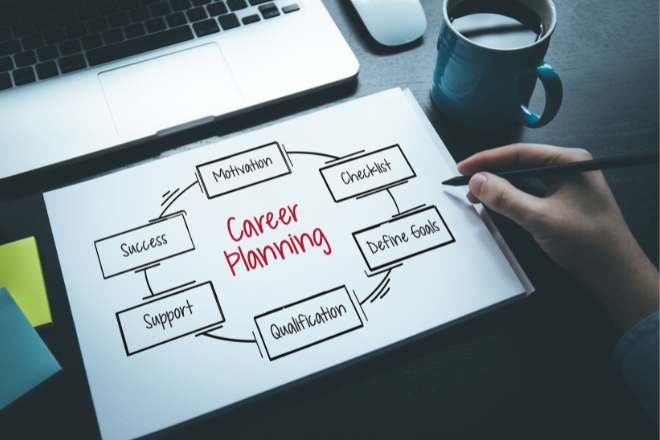Top 6 proactive habits to build the career you want

Finding the career you want might not happen overnight. Instead, it’s a process, and one that might have its difficulties. Developing healthy professional habits can keep you on track in the world of work, even when you face hardships/roadblocks that might otherwise throw you off-course. Read on to learn more about developing a career development plan, as well as learn about habits that can help you succeed as a professional!
Why is it important to have a career development plan?
A career development plan (CDP) can help you see the bigger picture when it comes to the world of work. Creating a CDP will be enlightening if you’ve ever felt like you’re a little unsure of why you’re working somewhere or what your next career move might be. Everyone’s CDP will be different, but they typically include short, medium and long-term goals that map out what your ideal career would look like.
Things aren’t always going to go to plan but creating a CDP can help you work out whether you need to focus on networking more, developing further skills, changing jobs or another aspect of your career. While it may be cliched, failing to plan can leave in a position where you’re planning to fail.
How to build your career development plan?

There are a few ways that you can build your career development plan. However, one of the easiest ways is to work out where you currently are in your career, work out where you want to be in your career, and then identify what’s currently missing. You might discover that you’re closer to your dream career than you thought, or you might have a bit of work to do. Both are OK, because it’s all part of the process.
You should also assess different parts of your work experience as part of the plan, including things like:
- What are my strengths in the workplace?
- What are my weaknesses in the workplace?
- What are the pros of my current job?
- What are the cons of my current job?
- Is my current role going to help me reach my dream career?
- Is there room to grow in my current career?
- What would my ideal next career move look like?
- Do I need to complete further study?
Completing a career development plan can often inspire you to make career moves that you might not have otherwise had the courage to make, so it’s an extremely worthwhile exercise. It’s also a welcome reminder of how much you’ve achieved to date, which is something that’s easy to forget – especially if you’re feeling like you’re in a bit of a rut.
What are some habits that can help build a successful career?
1. Develop your work-life balance
Establishing a healthy work-life balance can stop you from burning out in the workplace. While it can be tempting to work long hours and go far beyond what’s expected of you at work to get ahead, it’s important to remember that you’ll be most productive when you’re well-rested and happy.
FlexJobs’ 2018 study found that 76% of respondents valued work-life balance as a reason to look for a flexible role, so this may be something worth considering, especially as remote work becomes increasingly normalised following the pandemic. It’s important to ensure that your current role and way of working is best for you and your employer, not just your employer.
2. Continue learning new skills
The skills you take into a new job shouldn’t be the only skills you leave with when you finish that role. Instead, further study/professional development can help you move up the career ladder and encourage you to stay on top of the latest developments in your chosen industry/sector. A lifetime approach to learning can help you get ahead.
3. Look for a mentor within your network

Know someone that’s working in your dream career? Reach out to them. Hearing from people that are further along in their career journey can help you discover new things that you can do to push yourself forward. It’s also useful to have a sounding board for when you’re planning your next career move.
4. Set goals for yourself – even if they’re not mandated by your work
As mentioned previously, part of creating a career development plan is setting yourself goals. If you’re looking to push yourself at work, setting goals (whether they’re created by yourself or alongside your team) can help you feel a real sense of achievement and give you metrics to track how you’re progressing.
5. Speak up at work
Employers aren’t mind readers, as much as they’d like to be! Speaking up at work can be daunting at first, but it’s an excellent way of ensuring you continue to develop. Stagnating at work can be very detrimental to your career progression, so ensure you’re regularly communicating with your manager/the leadership team so you’re always moving forward.
6. Know when it’s time to find a new career
Not every role is going to be a perfect fit for you. The Australian Bureau of Statistics recently reported that in the year ending February 2022, 1.3 million Australians changed jobs, so don’t be afraid to follow the suit. Feel like you’ve learned everything you can in your current role, or want to feel excited about what you’re doing at work again? Changing roles might be the move that makes most sense for your current career trajectory.
Looking to take the next step in your career, but don’t know where to start? Upskilled is here to help. Upskilled offers a range of courses across a range of industries so you can continue to learn new skills and even change career paths. You can learn more about Upskilled’s courses here, or alternatively, contact Upskilled’s education consultants to find out what course/s might be right for you!


)
)

